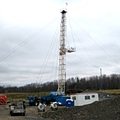- By Marcia E. Lynch
- News
 Print
Print  Following many months of research, a working group associated with the Tompkins County Council of Governments (TCCOG) is urging New York State to refrain from issuing drilling permits until it can capture appropriate taxes and fees and allocate them to cover costs to all levels of government, based on sound policy and verifiable data.
Following many months of research, a working group associated with the Tompkins County Council of Governments (TCCOG) is urging New York State to refrain from issuing drilling permits until it can capture appropriate taxes and fees and allocate them to cover costs to all levels of government, based on sound policy and verifiable data.The recommendation is part of a White Paper issued last week by the Tompkins County Workgroup on Assessment and Land Valuation, a subcommittee of the Tompkins County Council of Governments’ Gas Drilling Task Force. “Many changes to current policies are required to properly measure and collect tax revenue from Marcellus or Utica shale gas production,” maintains Tompkins County Legislator and Working Group chair Carol Chock.
The working group, which includes municipal officials, the County’s Director of Assessment, realtors, representatives of local financial institutions, real estate attorneys, and interested citizens, was formed to assist Tompkins County and its municipalities to prepare for potential impacts if the State approves high-volume horizontal gas drilling.
“Local officials may not realize that under the current system, there would be a minimum three-year lag between the time we need to budget and pay for extra expenses and the receipt of potential tax revenues,” Chock states. “The time lag increases if wells are drilled and capped. Further, we found the expected tax revenues to be far smaller than many of us had been projecting.”
“The current method of calculating the tax must be updated, adds Caroline Town Supervisor Don Barber, former Co-Chair of the Council of Governments and a member of the workgroup.. “That method was established in 1978 for a very different type of gas extraction, and it allows companies to self-report the amount of gas production with no verification.”
The report states: “New York State must develop revenue streams from gas extraction to pay for the additional costs to both State and local governments, at the time they are incurred, through a blend of permit fees, severance taxes collected by the State, and ad valorem property taxes collected by local taxing entities such as municipal governments and school districts.”
The research identifies four conditions that must be met before drilling permits can be considered:
- That New York establish a new severance tax and fee structure shared with local governments, as the most effective way of capturing tax revenue in a timely fashion;
- That new, accurate and verifiable methods of measuring shale gas be required as an essential condition of fair taxation;
- That the Unit of Production Value (“UPV”) formula be updated for shale gas through an open and transparent process; and
- That a minimum delay in collection of tax revenue be addressed through permit fees and a minimum annual assessment on production.
“We started the work of this committee to look at potential future impacts of hydrofracking— how might it impact our assessment rolls, the value of property in our community, and ultimately, the tax base,” says Chock.
“We have been promised a huge economic boom from drilling,” Barber concludes. “The reality is quite different, especially without significant tax changes and fees paid by the drilling industry.”
v8i9



